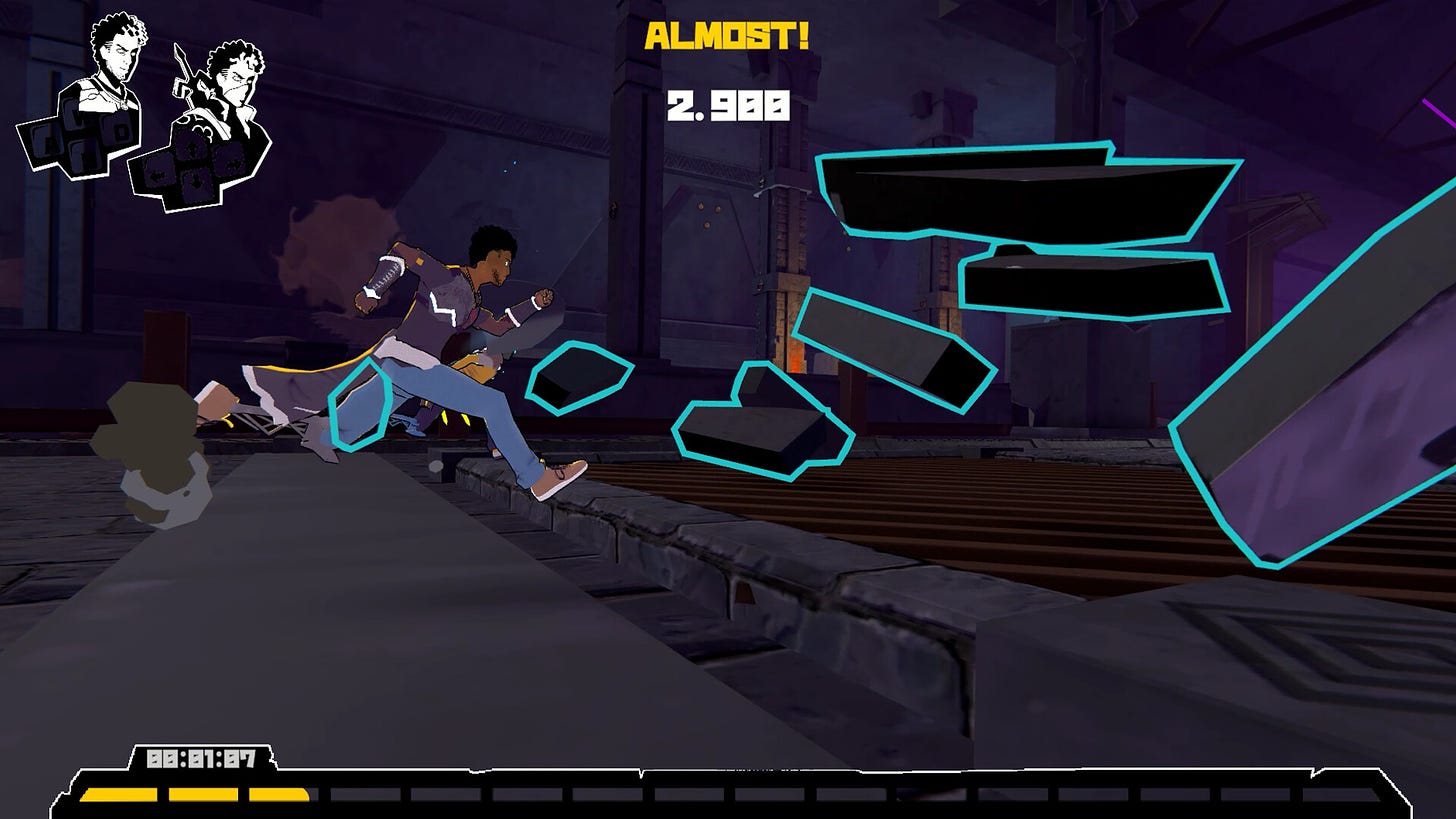Aerial_Knight is trying (once again) to turn a bad break into a great video game
Plus: A new gaming addiction lawsuit emerges in Florida, while Epic pushes back hard in Illinois.
“I did give up,” game developer Neil “Aerial_Knight” Jones recently told me, about the time he was fed up trying to find a spot in the game industry.
It was about four years ago. He had spent a half decade learning his craft, applying for one game development job after another. Nothing.
Jones was nearing 30 and frustrated. Everything he’d learned, he worried, was going to waste.
So he decided to at least make one game. For himself. And, you could say, for his kids, if he ever was going to have any. At the time, he thought: “They can play it and be like, ‘Oh, this is what dad did?’”
That first game, 2021’s Aerial Knight’s Never Yield was “me quitting this whole thing.”
But then things finally started breaking Jones’ way.
“People liked it,” he said.
“People bought the game. People left reviews.
“It stayed low-key, but it did well enough for them to give me a big budget—an okay budget—to do this.”
We were chatting on the final day of the Game Developers Conference in San Francisco last month. The “this” he mentioned was Aerial Knight’s We Never Yield, his second game, running on a laptop he had rested on a tall table, next to a tray of markers.
The markers weren’t mine or his. They were a communal thing. People would walk over to grab one so they could sign a big board a few feet away. It was covered in messages from game developers looking for jobs.
As we played We Never Yield, I asked Jones what he made of this moment, this bleak time in the industry that that nearby board helped memorialize.
“The industry pretty much never did nothing for me,” he said. “So it’s pretty much the same old, same old.“
He added: “I feel bad for everybody else, who now feels how I’ve been feeling pretty much my whole career.”
Jones, aka Aerial_Knight, refers to We Never Yield as a “Sonic type of game, with two Black characters and hip-hop music.”
And he calls it a leveling up of Never Yield.
It’s the product of some success and even more hardship for Jones, whose path, even after his first game’s success, has had formidable obstacles.
The first game put players in control of Wally, who automatically ran through level after level set in a futuristic version of Detroit, evading drones and armored soldiers. The core gameplay involved parkour, as Wally had to jump and slide to avoid obstacles. A big draw was the soundtrack full of jazz-flavored hip-hop from Dan Wilkins, a longtime friend of Jones, who had also struggled to break into the scene.
The sequel stars Wally and his twin brother, Lone, both perpetually on the run in level after level. One player can control both, or two players can try to clear the levels in co-op.
“The game's all about working together and overcoming challenges,” Jones said.
“I just wanted to make something that’s not dramatic, something where people don’t die all the time, something fun,” he said.
“In the first game, these two were chasing each other and trying to kill each other. Now they’re working together, and they resolved a lot of their issues.
“You don’t really see that in video games. It’s always people dying or in jail or something like that.”
After Never Yield was released in 2021, Jones hadn’t immediately planned to work on a sequel. That first game actually got him a job at the gaming tech company Unity.
Jones had developed Never Yield while juggling two day jobs and crafting it at night, he said. The whole thing had been a struggle. So when Unity contacted him about a job, he was into it, even as he shook his head.
He’d already reconciled himself to not getting any of those industry jobs he’d pursued years ago. “The game industry is very much a ‘You got to know somebody’ type of thing. So those jobs that were posted, they were already taken a lot of the time.”
He was in Detroit, which barely had a game industry. He’s Black, a distinct minority in game development. “I didn’t know anybody in the industry,” he said. “And there weren't a lot of Black people in charge saying, ‘Oh, let’s make this team look different.’”
Then Never Yield was out and, finally, a game company was calling.
“I had to launch a successful game on all platforms before I even got an okay job at Unity,” Jones said
It didn’t last. Unity started cutting jobs, and, in early 2023, Jones was laid off.
“When I got laid off, I took the severance and I was like, ‘I got time to sit here and make a couple of things.” He developed a prototype for one game and started tinkering with an update to Never Yield that blossomed into a full sequel.
For We Never Yield, Jones is working with British development team Beta Jester, and returning publisher Headup. The game’s score is again by Dan Wilkins. “We have a lot of the same tastes and come from the same culture, so he understands on a deeper level than most people what I want out of all of this,” Jones said.
To make a better sequel, Jones has scoured reviews and player feedback from the first. He took notes so he could “try to address everything.” The new game adjusts the difficulty options, has more story, makes it easier to unlock more outfits.
“I got some notes that this looked like a phone game,” he said of the first Never Yield. That’s why I leveled up the art so much.”
Another developer might have brushed off such harsh feedback. “I took the core of it,” Jones said. He wanted to learn.
Today, Jones isn’t giving up.
It’s been a journey, and he’s done it with very little in his pocket and just the faintest hope of success.
“That’s why it had no budget,” he says, thinking back to the original Never Yield, the game that was once going to be his farewell to the industry. “It was never meant to be anything.”
Item 2: A new gaming addiction lawsuit in Florida, as Epic pushes back at one in Illinois
Add Florida to the list of states where the world’s largest video game companies are facing addiction lawsuits.
Florida resident Shane Ayers has filed suit on behalf of their 11-year-old child, alleging that Nintendo, Sony, Microsoft, Epic, Roblox, Take Two and others engaged in “outrageous, immoral” efforts to hook their kid on games and market microtransactions to them.
The case echoes—and on some pages uses the same language—as six others brought against a similar collection of game companies in Arkansas, Missouri and Illinois, covered by Game File earlier this month. They cite industry patents designed to encourage repeated play and a “predatory” approach by the companies to monetizing the playing experience.
In the suits, including the Florida one, the plaintiffs say that the alleged gaming addiction upended their kids’ lives. The Ayers suit says their child plays for 4-6 hours a day, experiences withdrawal symptoms and requires a private tutor. It also notes they have been diagnosed with depression and ADHD.
The game companies have not responded to the Florida lawsuit. But in the other cases, they have pushed for dismissal, citing lack of specifics and First Amendment protections on creative speech. As is common with nearly any case brought against a game company by players, they also argue that the games’/platforms’ terms of service prohibit lawsuits and require private arbitration to resolve disputes.
On May 30, a court in Salt Lake City will hear a request by the plaintiffs in the non-Florida cases to consolidate them into one action. The game companies have called that a stalling tactic.
Epic cries foul: In one of the cases, brought by parent Cynthia Jimenez in Illinois, defendant Epic Games is pushing back aggressively, calling on the court to sanction the plaintiff for their allegedly “frivolous” lawsuit.
In a filing last week, the Fortnite maker said that information provided by Jimenez’s side indicated that the allegedly gaming-addicted minor in the case had only created an Epic account three days before the suit was filed—and had played Fortnite on it for less than an hour.
Jimenez’s attorneys say her child may have played on others’ accounts prior to that, Epic noted.
Epic’s attorneys add that “alleged ‘addiction’ requires more than a single brief instance of gameplay,” and calls claims against the company “baseless.”
Item 3: In brief
🔍 Women who play Riot Games’ Valorant continue to face toxic, sexist and threatening comments from other players, despite enforcement efforts, Kotaku reports.
👀 Activision is asking a judge to issue a $15 million judgment later this month against Call of Duty cheat-makers Engine Owning, who continue to promote cheats for the franchise, according to court documents reviewed by Game File.
While two defendants in the case settled last year, the others stopped communicating with their lawyer last year and are facing a default judgment by the court.
⚡️ The still-unannounced PlayStation 5 Pro, will include a more powerful graphics chip and will run the PS5’s CPU faster, potentially enabling better support for ray-tracing, The Verge reports. The upgraded console is expected for a late 2024 release.
📺 Fallout games are seeing a resurgence of interest on Xbox (Circana: “highest engagement rate..since October 2022”) and PC (all the way back to the original Fallout game) following last week’s critically-acclaimed airing of the new Fallout show on Amazon Prime. And thanks to some strategically timed sales, too.
🎬 AGBO, the media company partially led by Avengers Endgame directors Anthony and Joe Russo, acknowledged today that former Epic Games chief creative officer–-and Fortnite mastermind—Donald Mustard is a partner in the operation (first reported by me last November).
Mustard will oversee “AGBO's expansion of community-driven interactive and immersive experiences in games and virtual worlds,” per a press release.
AGBO has taken in significant investment from game companies, including $400 million from Nexon in 2022. Epic is also an investor.
🇩🇪 Nintendo will not attend this year’s Gamescom event in Cologne this August, a company rep told German outlet Games Wirtschaft, via VGC.
Last year, VGC and Eurogamer reported that Nintendo secretly demoed its successor to the Switch to some firms attending Gamescom. (Nintendo said that wasn’t true.)
😲 Content Warning, the comedy multiplayer game released for free on April Fool’s Day has sold more than one million copies, in addition to attracting 6.6 million free players, according to publisher Landfall Games.
💰 Someone has added microtransactions to the original Doom, freezing the game each time you pick up an item—until you pay. The hack was showcased by Tom’s Hardware.
💘 Game developer Aaron Nielsen made a game on the low-fidelity Playdate handheld to propose to his girlfriend, as he revealed on social media.
“At the end of the game all the collected letters would spell ‘Will you marry me?’ he wrote. “That was my cue to drop to one knee. Oh and don't worry, if she had selected ‘no’ it would have asked ‘are you sure’ and looped around!”








Great interview with Neil Jones! The struggle is forever real, regardless of industry.